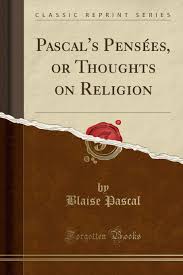Pensées Page #8
The Pensées is a collection of fragments on theology and philosophy written by 17th-century philosopher and mathematician Blaise Pascal. Pascal's religious conversion led him into a life of asceticism, and the Pensées was in many ways his life's work. The Pensées represented Pascal's defense of the Christian religion.
People of education are not called poets or mathematicians, etc.; but they are all these, and judges of all these. No one guesses what they are. When they come into society, they talk on matters about which the rest are talking. We do not observe in them one quality rather than another, save when they have to make use of it. But then we remember it, for it is characteristic of such persons that we do not say of them that they are fine speakers, when it is not a question of oratory, and that we say of them that they are fine speakers, when it is such a question. It is therefore false praise to give a man when we say of him, on his entry, that he is a very clever poet; and it is a bad sign when a man is not asked to give his judgment on some verses. 35 We should not be able to say of a man, "He is a mathematician," or "a preacher," or "eloquent"; but that he is "a gentleman." That universal quality alone pleases me. It is a bad sign when, on seeing a person, you remember his book. I would prefer you to see no quality till you meet it and have occasion to use it (Ne quid nimis[14]), for fear some one quality prevail and designate the man. Let none think him a fine speaker, unless oratory be in question, and then let them think it. 36 Man is full of wants: he loves only those who can satisfy them all. "This one is a good mathematician," one will say. But I have nothing to do with mathematics; he would take me for a proposition. "That one is a good soldier." He would take me for a besieged town. I need, then, an upright man who can accommodate himself generally to all my wants. 37 [Since we cannot be universal and know all that is to be known of everything, we ought to know a little about everything. For it is far better to know something about everything than to know all about one thing. This universality is the best. If we can have both, still better; but if we must choose, we ought to choose the former. And the world feels this and does so; for the world is often a good judge.] 38 A poet and not an honest man. 39 If lightning fell on low places, etc., poets, and those who can only reason about things of that kind, would lack proofs. 40 If we wished to prove the examples which we take to prove other things, we should have to take those other things to be examples; for, as we always believe the difficulty is in what we wish to prove, we find the examples clearer and a help to demonstration. Thus when we wish to demonstrate a general theorem, we must give the rule as applied to a particular case; but if we wish to demonstrate a particular case, we must begin with the general rule. For we always find the thing obscure which we wish to prove, and that clear which we use for the proof; for, when a thing is put forward to be proved, we first fill ourselves with the imagination that it is therefore obscure, and on the contrary that what is to prove it is clear, and so we understand it easily. 41 Epigrams of Martial.--Man loves malice, but not against one-eyed men nor the unfortunate, but against the fortunate and proud. People are mistaken in thinking otherwise. For lust is the source of all our actions, and humanity, etc. We must please those who have humane and tender feelings. That epigram about two one-eyed people is worthless,[15] for it does not console them, and only gives a point to the author's glory. All that is only for the sake of the author is worthless. Ambitiosa recident ornamenta.[16] 42 To call a king "Prince" is pleasing, because it diminishes his rank. 43 Certain authors, speaking of their works, say, "My book," "My commentary," "My history," etc. They resemble middle-class people who have a house of their own, and always have "My house" on their tongue. They would do better to say, "Our book," "Our commentary," "Our history," etc., because there is in them usually more of other people's than their own. 44 Do you wish people to believe good of you? Don't speak. 45 Languages are ciphers, wherein letters are not changed into letters, but words into words, so that an unknown language is decipherable. 46 A maker of witticisms, a bad character. 47 There are some who speak well and write badly. For the place and the audience warm them, and draw from their minds more than they think of without that warmth. 48 When we find words repeated in a discourse, and, in trying to correct them, discover that they are so appropriate that we would spoil the discourse, we must leave them alone. This is the test; and our attempt is the work of envy, which is blind, and does not see that repetition is not in this place a fault; for there is no general rule. 49 To mask nature and disguise her. No more king, pope, bishop--but august monarch, etc.; not Paris--the capital of the kingdom. There are places in which we ought to call Paris, Paris, and others in which we ought to call it the capital of the kingdom. 50 The same meaning changes with the words which express it. Meanings receive their dignity from words instead of giving it to them. Examples should be sought.... 51 Sceptic, for obstinate. 52 No one calls another a Cartesian[17] but he who is one himself, a pedant but a pedant, a provincial but a provincial; and I would wager it was the printer who put it on the title of Letters to a Provincial. 53 A carriage upset or overturned, according to the meaning To spread abroad or upset, according to the meaning. (The argument by force of M. le Maître[18] over the friar.) 54 Miscellaneous.--A form of speech, "I should have liked to apply myself to that." 55 The aperitive virtue of a key, the attractive virtue of a hook. 56 To guess: "The part that I take in your trouble." The Cardinal[19] did not want to be guessed. "My mind is disquieted." I am disquieted is better. 57 I always feel uncomfortable under such compliments as these: "I have given you a great deal of trouble," "I am afraid I am boring you," "I fear this is too long." We either carry our audience with us, or irritate them. 58 You are ungraceful: "Excuse me, pray." Without that excuse I would not have known there was anything amiss. "With reverence be it spoken ...." The only thing bad is their excuse. 59 "To extinguish the torch of sedition"; too luxuriant. "The restlessness of his genius"; two superfluous grand words. SECTION II THE MISERY OF MAN WITHOUT GOD 60 First part: Misery of man without God. Second part: Happiness of man with God. Or, First part: That nature is corrupt. Proved by nature itself. Second part: That there is a Redeemer. Proved by Scripture. 61 Order.--I might well have taken this discourse in an order like this: to show the vanity of all conditions of men, to show the vanity of ordinary lives, and then the vanity of philosophic lives, sceptics, stoics; but the order would not have been kept. I know a little what it is, and how few people understand it. No human science can keep it. Saint Thomas[20] did not keep it. Mathematics keep it, but they are useless on account of their depth.
Translation
Translate and read this book in other languages:
Select another language:
- - Select -
- 简体中文 (Chinese - Simplified)
- 繁體中文 (Chinese - Traditional)
- Español (Spanish)
- Esperanto (Esperanto)
- 日本語 (Japanese)
- Português (Portuguese)
- Deutsch (German)
- العربية (Arabic)
- Français (French)
- Русский (Russian)
- ಕನ್ನಡ (Kannada)
- 한국어 (Korean)
- עברית (Hebrew)
- Gaeilge (Irish)
- Українська (Ukrainian)
- اردو (Urdu)
- Magyar (Hungarian)
- मानक हिन्दी (Hindi)
- Indonesia (Indonesian)
- Italiano (Italian)
- தமிழ் (Tamil)
- Türkçe (Turkish)
- తెలుగు (Telugu)
- ภาษาไทย (Thai)
- Tiếng Việt (Vietnamese)
- Čeština (Czech)
- Polski (Polish)
- Bahasa Indonesia (Indonesian)
- Românește (Romanian)
- Nederlands (Dutch)
- Ελληνικά (Greek)
- Latinum (Latin)
- Svenska (Swedish)
- Dansk (Danish)
- Suomi (Finnish)
- فارسی (Persian)
- ייִדיש (Yiddish)
- հայերեն (Armenian)
- Norsk (Norwegian)
- English (English)
Citation
Use the citation below to add this book to your bibliography:
Style:MLAChicagoAPA
"Pensées Books." Literature.com. STANDS4 LLC, 2024. Web. 25 Nov. 2024. <https://www.literature.com/book/pens%C3%A9es_114>.




Discuss this Pensées book with the community:
Report Comment
We're doing our best to make sure our content is useful, accurate and safe.
If by any chance you spot an inappropriate comment while navigating through our website please use this form to let us know, and we'll take care of it shortly.
Attachment
You need to be logged in to favorite.
Log In